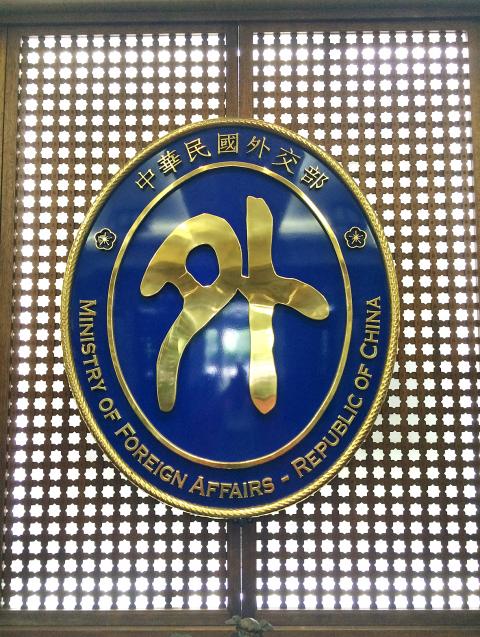The Ministry of Foreign Affairs (MOFA) yesterday condemned Chinese who have been harassing a Taiwanese restaurant in Chile that reportedly had shown support for the pro-democracy protests in Hong Kong.
The ministry condemned and denounced the irrational and violent behavior of a Chinese mob that stormed the shop last week, spokeswoman Joanne Ou (歐江安) said.
The Representative Office of Taiwan in Santiago contacted the Taiwanese owner of Pollo Chang, surnamed Chang (張), on Friday after learning of the incident to express the government’s determination to protect the safety of its nationals overseas, she said.

Photo: Lu Yi-hsuen, Taipei Times
The office would work with Chang should he decide to report the incident to the Chilean police and offer legal assistance should he need any, she said.
According to an online post on Friday that has circulated on the Web since, a Chinese mob in Santiago shut down the fast-food and bubble tea shop after they found Chang supported the Hong Kong protests.
The post did not say why the group of Chinese believed that Chang supported the Hong Kong protesters.
A group of Chinese citizens stormed into Pollo Chang to hang a People’s Republic of China flag and sing the Chinese national anthem, which forced the shop to shut, according to a video clip posted on YouTube.
It was reportedly the latest in a series of incidents.
However, Ou yesterday said that Pollo Chang has resumed operations.
She also said the ministry fully supports Chang’s freedom of expression in supporting the ongoing protests in Hong Kong.

Right-wing political scientist Laura Fernandez on Sunday won Costa Rica’s presidential election by a landslide, after promising to crack down on rising violence linked to the cocaine trade. Fernandez’s nearest rival, economist Alvaro Ramos, conceded defeat as results showed the ruling party far exceeding the threshold of 40 percent needed to avoid a runoff. With 94 percent of polling stations counted, the political heir of outgoing Costa Rican President Rodrigo Chaves had captured 48.3 percent of the vote compared with Ramos’ 33.4 percent, the Supreme Electoral Tribunal said. As soon as the first results were announced, members of Fernandez’s Sovereign People’s Party

MORE RESPONSIBILITY: Draftees would be expected to fight alongside professional soldiers, likely requiring the transformation of some training brigades into combat units The armed forces are to start incorporating new conscripts into combined arms brigades this year to enhance combat readiness, the Executive Yuan’s latest policy report said. The new policy would affect Taiwanese men entering the military for their compulsory service, which was extended to one year under reforms by then-president Tsai Ing-wen (蔡英文) in 2022. The conscripts would be trained to operate machine guns, uncrewed aerial vehicles, anti-tank guided missile launchers and Stinger air defense systems, the report said, adding that the basic training would be lengthened to eight weeks. After basic training, conscripts would be sorted into infantry battalions that would take

GROWING AMBITIONS: The scale and tempo of the operations show that the Strait has become the core theater for China to expand its security interests, the report said Chinese military aircraft incursions around Taiwan have surged nearly 15-fold over the past five years, according to a report released yesterday by the Democratic Progressive Party’s (DPP) Department of China Affairs. Sorties in the Taiwan Strait were previously irregular, totaling 380 in 2020, but have since evolved into routine operations, the report showed. “This demonstrates that the Taiwan Strait has become both the starting point and testing ground for Beijing’s expansionist ambitions,” it said. Driven by military expansionism, China is systematically pursuing actions aimed at altering the regional “status quo,” the department said, adding that Taiwan represents the most critical link in China’s

EMERGING FIELDS: The Chinese president said that the two countries would explore cooperation in green technology, the digital economy and artificial intelligence Chinese President Xi Jinping (習近平) yesterday called for an “equal and orderly multipolar world” in the face of “unilateral bullying,” in an apparent jab at the US. Xi was speaking during talks in Beijing with Uruguayan President Yamandu Orsi, the first South American leader to visit China since US special forces captured then-Venezuelan president Nicolas Maduro last month — an operation that Beijing condemned as a violation of sovereignty. Orsi follows a slew of leaders to have visited China seeking to boost ties with the world’s second-largest economy to hedge against US President Donald Trump’s increasingly unpredictable administration. “The international situation is fraught